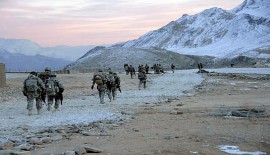
It is worth reading an article in Foreign Policy magazine by Joshua S Goldstein on the future of warfare, “Think Again: War”. Writing for an American audience, Professor Goldstein notes that in the past decade there have been fewer wars and fewer deaths in war than at any time in the last century, and he wants to reassure his readers that the end of American dominance will not change that.
Large armies are becoming harder to raise and sustain, technological advance has increased the accuracy of munitions and thus reduced the amount of collateral damage, and states are finding peaceful ways of resolving their disputes rather than resorting to force. All this is good news.
Some writers fear that the rise of China will inevitably bring it into conflict with the United States. Why else would it want an aircraft carrier?
Professor Goldstein points out that Chinese military expenditure, while growing fast and now second only to that of the United States in the world, is still a distant second: $100 billion a year compared with $700 billion. Furthermore, Chinese interests are utterly entwined with those of America, given that its economy is heavily dependent on exports and that it owns a large amount of US government debt, so a conflict between them would be entirely counterproductive.
While the end of American hegemony will be replaced by a multipolar world, that multipolar world will not be torn by war. Looking into history, he suggests that
The best precedent for today’s emerging world order may be the 19th-century Concert of Europe, a collaboration of great powers that largely maintained the peace for a century …
But let me complete that sentence:
until its breakdown and the bloodbath of World War I.
Ah, not quite so rosy, then. In the years before the first world war, the assumption was that the economic interests of the UK and Germany were so entwined that they could not fight each other. Indeed, even once the war broke out, the UK was still importing dyes from Germany in order to make uniforms for its soldiers. But the theory that economics would overrule politics proved to be wrong.
The difficult economic times that the world is now in are increasing the conflicts of interest between the world’s powers. While attempting to resolve those conflicts by force would be counterproductive, I am less confident that Professor Goldstein that no-one is going to try. The need for our global institutions is growing and not diminishing.
